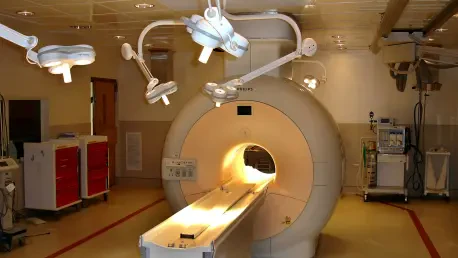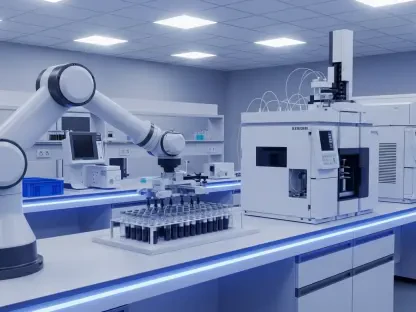Recent developments have propelled the field of oncology drug development into a new era, primarily due to the integration of artificial intelligence. Startups like Pathos AI Inc. exemplify this shift by leveraging AI to streamline vital processes within oncology research. The company has successfully raised $365 million in a Series D funding round, bolstering its valuation to $1.6 billion. This substantial investment underlines the confidence investors have in AI’s potential to redefine pharmaceutical research. An entirely new wave of AI-driven methodologies is emerging, promising to revolutionize how drugs are designed, developed, and tested. Pathos is at the forefront, aiming to transform oncology drug development and ensure that novel, effective treatments reach patients faster than ever before.
The Role of Artificial Intelligence in Drug Development
Enhancing Data Processing and Clinical Trials
Pathos has designed a cutting-edge platform named PathOS that houses enormous amounts of oncology and genomic data. This platform is pivotal in enhancing how researchers handle clinical trials for new drugs, streamlining tasks that previously required laborious manual analysis. Processed in petabytes, the data aids researchers in understanding intricate cancer behaviors, which is crucial for creating effective therapies. Pathos intends for these advancements to underpin the clinical studies of two cancer drugs licensed from Novo Nordisk and Prelude Therapeutics, indicating the practical application of their AI-powered platform. The platform not only funds these trials but also optimizes trial designs by incorporating multimodal clinical, molecular, and imaging data, providing a comprehensive view necessary for nuanced decision-making in drug development scenarios.
Furthermore, by automating the identification of new cancer biomarkers, AI significantly accelerates the pace of research. These biomarkers are essential in diagnosing various cancer types and assessing treatment success, ultimately guiding more personalized treatment plans. The integration of Tempus AI’s anonymized oncology data further enriches Pathos’s model, demonstrating the collaborative spirit and shared objectives within the industry. The $200 million investment in data licensing and model development further illustrates the scale and potential impact of this initiative on future drug trials.
Collaborations and Industry-Wide Embrace of AI
AI’s integration into oncology research extends beyond individual company efforts, as seen through industry-wide collaborations and partnerships. Pathos’s partnership with pharmaceutical giant AstraZeneca represents a forward-thinking approach to cancer treatment innovation. By leveraging AstraZeneca’s vast resources and expertise, combined with AI-driven insights from Pathos, the potential for groundbreaking drug therapies is monumental. Such collaborations underscore the trend towards a more interconnected research ecosystem, where data and technology are shared to achieve common goals: improved patient outcomes and more efficient therapeutic development processes.
The involvement of tech titans like Google and Microsoft in advancing AI models for medical research further highlights the transformative potential of AI in healthcare. These companies are actively developing sophisticated AI models aimed specifically at medical applications, indicating a broader acceptance and application of AI technologies in drug development. Such endeavors reflect a shift in focus towards harnessing AI’s predictive power, computational strength, and deep learning capabilities to gain insights that were once unimaginable, proving indispensable in devising innovative treatments and solutions.
Future Implications and Steps Forward
Building on Current Successes
As the field progresses rapidly, ongoing advances are continuously building on past successes, illustrating AI’s transformative potential in oncology drug development. The substantial investment in AI technologies by companies like Pathos AI, along with stringent developmental processes, ensures the realization of highly effective cancer therapies with patient-specific targeting. This paradigm shift will likely prompt other companies to integrate AI technologies into their research and development frameworks. By easing drug discovery and refining clinical trials with precise, data-driven insights, AI stands to forge new paths in treatment efficacy and safety.
Moreover, the seamless interaction between AI models and real-world clinical settings presents new opportunities for research breakthroughs. Companies are increasingly focused on developing AI algorithms capable of navigating complex datasets to unravel cancer’s molecular underpinnings, enabling highly specialized treatment options. This focus is likely to enrich the overall landscape of oncology drug development, creating a more fertile ground for continual innovation.
Expanding AI’s Influence in Medicine
Pathos has developed a state-of-the-art platform, PathOS, which stores vast quantities of oncology and genomic data, transforming how researchers conduct clinical trials for new medications. By processing petabytes of data, this platform allows researchers to better understand complex cancer behaviors, essential for devising effective treatments. PathOS supports the clinical trials of two cancer drugs licensed from Novo Nordisk and Prelude Therapeutics, showcasing its AI-driven application. It not only funds these trials but enhances trial designs by integrating multimodal clinical, molecular, and imaging data, providing the detailed perspective necessary for informed decisions in drug development.
Moreover, AI speeds up research by automating the discovery of new cancer biomarkers, crucial for diagnosing different cancer types and evaluating treatments, thereby facilitating tailored therapy plans. The inclusion of Tempus AI’s anonymized oncology data enriches PathOS’s model, emphasizing collaboration and shared goals within the industry. A $200 million investment in data licensing and model development underscores the expansive potential impact of this project on future drug trials.









